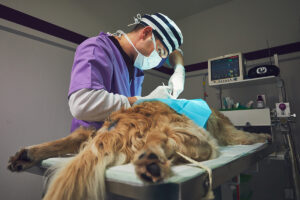
If your pet requires surgery, you will need to prepare yourself to care for their incision site to ensure proper healing.
As a responsible pet owner, it’s essential to know how to care for your furry friend after surgery, especially when it comes to tending to their incision site. Proper post-operative care is crucial for ensuring your pet’s speedy and successful recovery. In this guide, we’ll walk you through the basics of caring for your pet’s incision site, from understanding the importance of incision care to providing step-by-step instructions on how to do it effectively.
Importance of Incision Care
After surgery, your pet’s incision site is vulnerable to infection and complications. Proper incision care is essential for several reasons:
- Preventing Infections: An open wound is susceptible to bacteria and germs that can lead to infections. Keeping the incision site clean is vital in preventing this.
- Promoting Healing: A well-maintained incision site heals faster and better, reducing the risk of complications.
- Minimizing Discomfort: Proper care ensures your pet’s comfort and reduces pain or discomfort at the incision site.
- Reducing Scarring: Correct care can help minimize scarring, allowing your pet to return to a normal, happy life.
Step-by-Step Guide to Caring for Your Pet’s Incision Site
Follow Veterinarian Instructions
The most crucial step in caring for your pet’s incision site is to follow your veterinarian’s instructions. Your vet knows your pet’s specific needs, so always consult with them before implementing any changes or additional care. Don’t be afraid to ask any questions you have—your veterinarian will be happy to help you understand how to care for your pet and explain why things need to be done a certain way if you’re feeling unsure about any of the instructions.
Keep the Area Clean
To avoid infection, it’s essential to keep the incision site clean. Gently wipe around the incision with a clean, damp cloth to remove any dirt or debris. Avoid using alcohol, hydrogen peroxide, or any harsh chemicals, as they can be too abrasive.
Monitor for Signs of Infection
Be vigilant and watch for signs of infection, such as increased redness, swelling, discharge, or a foul odor around the incision site. If you notice any of these symptoms, contact your veterinarian immediately.
Prevent Licking or Chewing
Pets tend to lick or chew at incision sites, which can lead to complications. To prevent this, you can use an Elizabethan collar (often called an e-collar or “cone of shame”) to keep your pet from reaching the incision. While your pet may find this uncomfortable at first, it’s a crucial part of the healing process.
Administer Medication
If your vet prescribes medication, make sure to give it to your pet as directed. This may include pain relievers, antibiotics, or anti-inflammatories. Follow the dosage and schedule precisely.
Limit Activity
During the initial recovery period, restrict your pet’s physical activity as directed by your veterinarian or board-certified veterinary surgeon. This may mean shorter walks or keeping them indoors to avoid running or jumping, which could put a strain on the incision site.
Maintain a Comfortable Environment
Create a comfortable and quiet space for your pet to recover. Provide them with clean bedding, fresh water, and a safe, stress-free environment to facilitate healing.
Scheduled Follow-Up Appointments
Regular follow-up appointments with your veterinarian are essential to monitor your pet’s progress and address any concerns. Your vet will assess the healing process and provide further guidance on care.
Trust Maryland Veterinary Surgical Services With Your Companion’s Health
Your companion’s health is important, and the team at MVSS is ready to provide the best care possible for your furry family. We are dedicated to combining comprehensive exams and assessments with informative and honest discussions of your companion’s care. Once we have worked with you to decide on the best course of action for your dog, our professionals will use their surgical expertise to work towards the goal of giving your companion an active and pain-free life. We are proud to serve loyal companions in Catonsville and Baltimore. To learn more about our services, give us a call at 410-788-4088 or visit us online. For more information and tips for pet health, follow us on Facebook and Pinterest.
